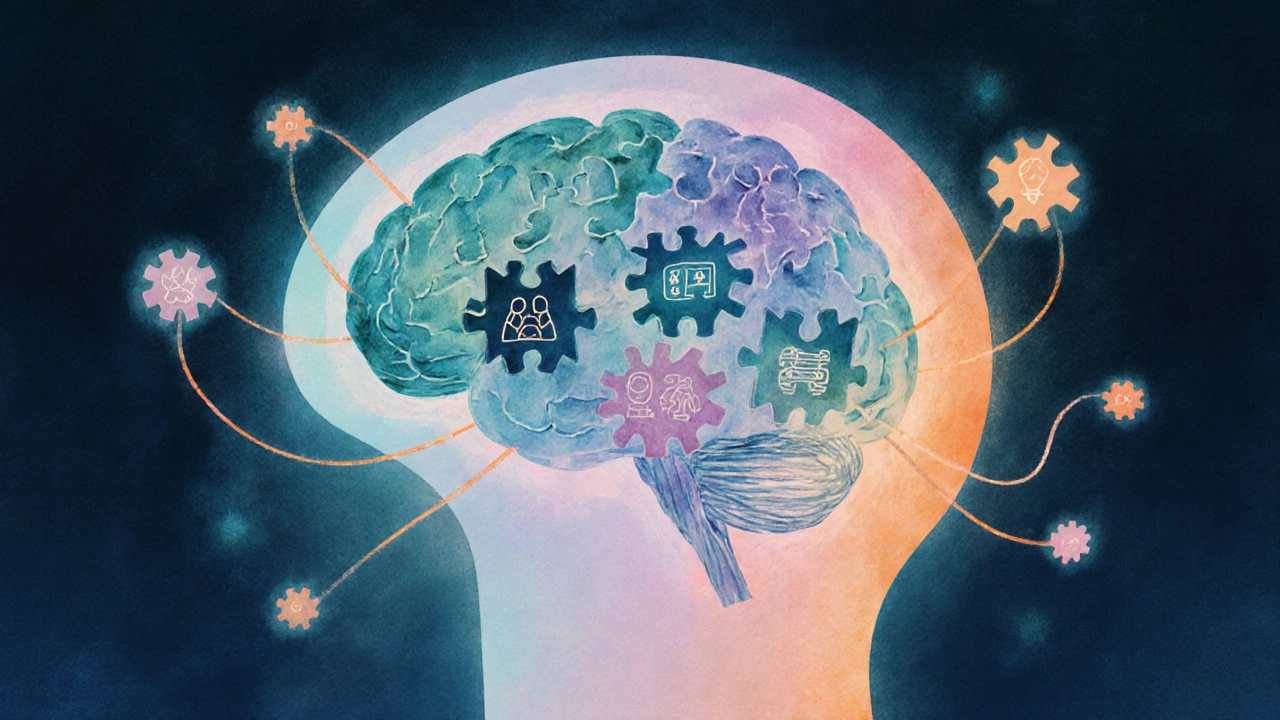Behavior disorders are a group of persistent patterns of disruptive, aggressive, or antisocial behavior that interfere with daily functioning. They show up in children and adults alike, ranging from hyperactivity to chronic defiance. At the same time, mental health issues encompass conditions like depression, anxiety, and trauma-related disorders that affect thoughts, emotions, and overall wellbeing. While the two categories sound separate, research over the past decade shows they’re tightly intertwined.
Key Takeaways
- Behavior disorders often co‑occur with mental health conditions such as depression and anxiety.
- Shared risk factors include genetics, early trauma, and chronic stress.
- Early identification and integrated treatment improve outcomes for both sets of problems.
- Parents, educators, and clinicians should look for emotional symptoms when behavior issues arise, and vice versa.
- Holistic approaches-therapy, skill‑building, and supportive environments-address the root of the connection.
What Exactly Are Behavior Disorders?
Common examples include:
- Attention‑Deficit/Hyperactivity Disorder (ADHD) - marked by inattention, impulsivity, and hyperactive actions.
- Oppositional Defiant Disorder (ODD) - characterized by a pattern of angry or irritable mood, argumentative behavior, and defiance of authority.
- Conduct Disorder - more severe, involving aggression toward people or property and violation of social norms.
These conditions are diagnosed using criteria from the DSM‑5 or ICD‑11 and require that symptoms persist for at least six months and cause functional impairment.
Understanding Mental Health Issues
When we talk about mental health, we typically mean:
- Depression - pervasive low mood, loss of interest, and physical symptoms such as fatigue.
- Anxiety disorders - excessive worry, panic attacks, and avoidance behaviors.
- Post‑traumatic Stress Disorder (PTSD) - intrusive memories, hyper‑arousal, and avoidance after a traumatic event.
These conditions affect mood, cognition, and behavior, often leading to reduced quality of life.
Why Do They Overlap?
Three major pathways explain the overlap:
- Shared biological roots: Studies show that genetics play a role in both behavior disorders and mood disorders. Certain gene variants (e.g., those affecting dopamine regulation) increase susceptibility to impulsivity and depressive symptoms.
- Environmental stressors: Early exposure to trauma - such as neglect, abuse, or chronic family conflict - can trigger both disruptive behavior and later anxiety or depression.
- Neurochemical imbalances: Dysregulation of neurotransmitters like serotonin and norepinephrine links hyperactivity with emotional instability. When these messengers are out of whack, the brain struggles to regulate both external actions and internal feelings.
Because the same risk factors feed both sides, you’ll often see a child with ADHD also battling low self‑esteem that spirals into depression during adolescence.

Common Co‑Occurring Pairings
| Behavior Disorder | Typical Behavioral Symptoms | Common Mental Health Comorbidity | Prevalence (of comorbidity) |
|---|---|---|---|
| ADHD | Inattention, impulsivity, hyperactivity | Depression, Anxiety | 30‑40% |
| ODD | Argumentativeness, irritability, defiance | Conduct Disorder, Mood disorders | 25‑35% |
| Conduct Disorder | Aggression, property destruction, rule breaking | Substance Use, PTSD | 20‑30% |
These numbers come from large‑scale epidemiological surveys in the UK and US conducted between 2018‑2023.
How to Spot the Connection Early
When a child or adult shows persistent behavioral problems, ask these extra questions:
- Do they often feel sad, hopeless, or worthless?
- Are there frequent worries that interfere with school or work?
- Has there been a recent loss, bullying, or traumatic event?
- Do they avoid social situations or seem unusually fearful?
Conversely, if someone presents with depression or anxiety, screen for hidden behavioral symptoms such as irritability, poor impulse control, or frequent rule‑breaking.
Integrated Treatment Strategies
Separate therapies for each condition can leave gaps. A combined approach usually works best:
- Medication: Stimulants for ADHD often improve attention and reduce frustration, which can ease depressive symptoms. Antidepressants may also help with irritability linked to ODD.
- Psychotherapy: Cognitive‑behavioral therapy (CBT) tackles negative thought patterns while teaching coping skills for impulsivity. For younger kids, parent‑training programs (e.g., Triple P) improve home dynamics.
- Skill‑building: Social‑skills groups, mindfulness training, and executive‑function coaching address both behavioral regulation and emotional regulation.
- Environmental adjustments: Consistent routines, clear expectations, and reduced exposure to chronic stressors (e.g., housing instability) make a big difference.
Collaboration between pediatricians, psychiatrists, teachers, and families is key. When each professional shares observations, the treatment plan can target the whole person, not just a single label.
Prevention & Long‑Term Outlook
Early, proactive steps can blunt the cascade from behavior problems to mental health crises:
- Screen for developmental delays and behavioral red flags at well‑child visits (American Academy of Pediatrics recommends screening at 9, 18, and 30 months).
- Promote secure attachments-responsive caregiving reduces the impact of stress on brain development.
- Teach emotion‑identification early: naming feelings helps kids regulate both mood and actions.
- Provide safe, structured extracurricular activities that channel energy positively (sports, arts, community clubs).
Children who receive timely interventions are up to 50% less likely to develop severe mood disorders in teenage years, according to a 2022 longitudinal study in the UK.

Frequently Asked Questions
Can a person have a behavior disorder without any mental health issues?
Yes. Some individuals display disruptive behavior but never meet criteria for depression, anxiety, or trauma‑related disorders. However, even in "pure" cases, there’s often sub‑clinical emotional distress that may emerge later.
Is medication always needed when both types of conditions co‑occur?
Not always. Medication can be helpful, especially for ADHD or severe depression, but many families succeed with therapy, behavioral coaching, and environmental changes alone. A qualified clinician should weigh benefits against side‑effects.
How do schools support students with both behavior and mental health challenges?
Effective schools use multi‑tiered systems of support (MTSS). Tier1 offers universal social‑emotional learning; Tier2 provides targeted small‑group interventions; Tier3 delivers individualized plans, often involving school psychologists and external therapists.
Are adults affected by the same link between behavior and mental health?
Absolutely. Adults with untreated childhood behavior disorders are at higher risk for substance use, mood disorders, and personality disorders. Early adult screening can catch emerging issues before they become entrenched.
What role does genetics play in this connection?
Twin studies estimate that genetics account for roughly 40‑60% of variance in both behavior disorders and mood disorders. Certain alleles affecting dopamine transport increase the likelihood of both impulsivity and depressive symptoms.
Understanding the dance between behavior disorders and mental health issues helps us move from labeling to caring. By spotting the link early, using integrated treatment, and fostering supportive environments, we give people a real chance to thrive-not just survive.

Interesting overview of how behavior disorders and mental health intersect. The article does a solid job linking genetics and environment, which is something I’ve seen in research. I appreciate the practical tips for early screening – they’re realistic and actionable. Overall, it’s a balanced piece that bridges clinical jargon and everyday language.
It’s suspicious how quickly the narrative jumps to medication as the default solution without addressing the profit motives behind pharma. Sure, drugs help some, but the oversimplification feels engineered.
Spot on, thanks for the concise summary 😊
Great breakdown! I’d add that schools really need to adopt universal screening protocols – it saves kids later on. Also, parental involvement can’t be overstated; consistency at home reinforces therapeutic gains. Don’t forget to monitor side effects of meds regularly, especially in adolescents. Keep sharing these evidence‑based insights!
The piece tries to paint a rosy picture of integrated treatment, yet it conveniently glosses over the systemic barriers that cripple real‑world implementation. First, insurance reimbursement models still reward siloed appointments rather than collaborative care, forcing families to juggle multiple specialists. Second, the shortage of trained clinicians adept at both behavior disorders and mood disorders means waiting lists stretch into months. Third, cultural stigma attached to psychiatric labels often deters parents from seeking early help, which the article barely acknowledges. Fourth, the data cited are predominantly from Western cohorts, ignoring the nuanced presentations in low‑resource settings. Fifth, there’s an overreliance on pharmacology, as if a pill can magically align neurochemical pathways without addressing underlying trauma. Sixth, the emphasis on “early identification” fails to consider that many symptoms are masked by adaptive behaviors in school environments. Seventh, the suggested parent‑training programs assume a level of literacy and time commitment many families cannot meet. Eighth, when schools adopt multi‑tiered support, they often lack the funding to sustain tier‑3 individualized plans. Ninth, the article’s optimism about “holistic approaches” overlooks the fact that interdisciplinary meetings are logistically complex and prone to miscommunication. Tenth, it neglects the role of socioeconomic stressors that perpetuate both disruptive behavior and depressive states. Eleventh, research shows that comorbidity rates can be inflated by diagnostic overlap rather than true co‑occurrence. Twelfth, the claim that integrated therapy “improves outcomes” needs granular, longitudinal data, which is still scarce. Thirteenth, practitioners are left to navigate conflicting guidelines from DSM‑5 and ICD‑11, a bureaucratic maze the article sidesteps. Fourteenth, caregiver burnout is a silent crisis that can sabotage even the best‑designed interventions. Fifteenth, the piece fails to address how digital health tools might bridge gaps, despite emerging evidence. Finally, while the intent is commendable, the narrative feels more like a promotional brochure than a critical, evidence‑based analysis.
The short‑term focus is unrealistic.
Whoa, you just ripped the whole article to shreds! Honestly, it’s refreshing to see someone call out the fluff and demand real accountability. The data gaps you mentioned are exactly why we need louder voices in this space.
Hold up, this is not about “loud voices” but about protecting our national health standards. We can’t let foreign‑influenced research dictate policies that harm our communities.
Such moralizing ignores the lived experience of those battling both ADHD and depression. We should prioritize compassion over nationalist rhetoric.
Let’s remember that the ultimate goal is helping people thrive, not winning debates. Collaboration between clinicians, families, and educators can bridge the gaps you all highlighted.
True, but one must question whether the so‑called collaboration isn’t just a veneer for power dynamics that keep the status quo intact. It’s a philosophical dilemma worth pondering.
The integration model rests on robust neurodevelopmental frameworks that align behavioral phenotypes with affective circuitry. Empirical studies demonstrate that targeted CBT combined with pharmacotherapy yields statistically significant reductions in comorbid symptomatology. Moreover, cross‑modal neuroimaging validates the shared dopaminergic pathways implicated in both ADHD and depressive disorders. Practitioners should thus adopt a transdiagnostic lens to optimize treatment efficacy.
Wow, another academic sermon. It’s like you’re trying to sound smart while ignoring the messy reality of everyday clinics. People aren’t just data points.
When we contemplate the intricate dance between externalized behaviors and internal emotional landscapes, we are essentially peering into the human condition itself. The ancient philosophers warned that the soul and the body are inseparable, a notion echoed today by neuroscientists mapping the brain’s reward circuits. Each impulsive act, each fleeting mood, can be traced to an interplay of genetics, environment, and personal narrative. Yet modern discourse tends to compartmentalize these elements, creating artificial silos that hinder holistic understanding. By embracing a narrative that weaves together the threads of trauma, neurochemistry, and social context, we honor the complexity of the individual. This perspective invites clinicians to listen more deeply, to see beyond diagnostic checklists, and to co‑create pathways to resilience. It also challenges policymakers to allocate resources that reflect this integrative vision, rather than funding fragmented programs. In doing so, we move from a paradigm of merely managing symptoms to one of fostering flourishing. The stakes are high, for every missed connection can cascade into a lifetime of struggle. Thus, the call to action is not merely academic-it is a moral imperative that reverberates across generations.
This is exactly what our system needs – straight talk and decisive action.
Oh great, another self‑help manifesto that assumes we all have the luxury of time for “early screening” and “holistic approaches.” Sure, if you’re a privileged parent with endless resources.
While it’s true that resources vary, the principles outlined can be adapted to low‑cost community settings, offering hope even where budgets are tight.
Indeed; the evidence suggests that even minimal interventions-such as structured play, consistent routines, and supportive dialogue-can yield measurable benefits; practitioners should therefore prioritize scalability and accessibility; this aligns with public‑health best practices.